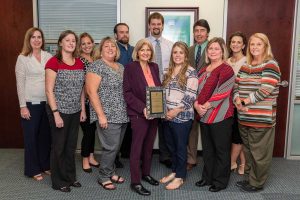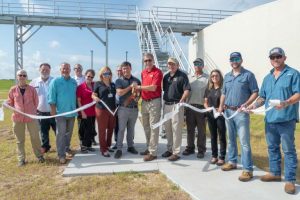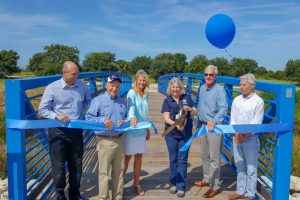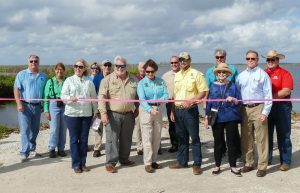Dec. 14, 2018
The Florida Department of Environmental Protection presented a $2.45 million check to the St. Johns River Water Management District toward a project to clean up Melbourne’s Crane Creek, a tributary of the Indian River Lagoon. Located in West Melbourne, Melbourne Village and portions of unincorporated Brevard County, the project will reduce the flow of nutrients and sediments to the lagoon by returning to the St. Johns River billions of gallons of freshwater flow each year. Major project components include an operable weir located near the natural coastal ridge, a stormwater pump station and a stormwater treatment area to ensure that nutrients and sediments are removed prior to the water’s return to the St. Johns River.
Dec. 11, 2018
The District Governing Board on Tuesday approved the ranking of projects to share in up to $2.83 million in cost-share funds to benefit water resources in Rural Economic Development Initiative (REDI) communities and for projects that use innovative technology to provide data supporting future permitting and full-scale implementation of alternative water supplies.
Dec. 3, 2018
The District kicked off its second annual participating in the statewide Skip a Week campaign, a campaign designed to save water during the cooler months of December, January and February by encouraging everyone to skip every other week of irrigation when grass is dormant.
Nov. 15, 2018
The District was awarded the Certificate of Achievement for Excellence in Financial Reporting for its fiscal year 2016-2017 Comprehensive Annual Financial Report (CAFR) from the Government Finance Officers Association (GFOA) of the United States and Canada. District Accounting Director Greg Rockwell also was recognized. The Certificate of Achievement is the highest form of recognition in governmental accounting and financial reporting and its attainment represents a significant accomplishment by a government and its management. Rockwell received an Award of Financial Reporting Achievement as the individual primarily responsible for preparing the award-winning CAFR.

Nov. 15, 2018
The District Governing Board voted to award contracts for water quality projects at Doctors Lake in Clay County and at Lake Apopka in Orange and Lake counties. Projects at each lake will utilize innovative technology to remove phosphorus. The Doctors Lake Phosphorus Removal Project will provide additional treatment of effluent from a wastewater treatment plant to remove phosphorus prior to entering Doctors Lake. The project is expected to remove an estimated 6,500 pounds of phosphorus annually. The project cost is $1.5 million. The Lake Apopka Innovative Total Phosphorus Removal Project will supplement the District’s restoration timeline by removing phosphorus from the lake’s water. The project is expected to remove 10,000 pounds of phosphorus over a 24-month period.
Oct. 4, 2018
The District launched an improved and enhanced online camping reservation system that ensures faster turnaround times for group camping reservations and vehicular access to its lands, as well as saving staff time to process requests, thereby saving taxpayers money.
Sept. 28, 2018
The District awarded Blue School Grants to 14 schools for projects to enhance student development in science, technology, engineering and math (STEM)-related topics. Thirty-seven teachers applied for funding in 2018 and of them the top 14 projects were selected. The program offers a total of $20,000 in financial support to teachers working to promote water resource protection through hands-on learning opportunities.
Sept. 25, 2018
The District’s Governing Board adopted its fiscal year 2018-2019 budget of $142.5 million, funding major projects and reducing the millage rate for taxpayers for a sixth consecutive year.
Sept. 12, 2018
The District’s Governing Board approved moving forward with contracts for three agricultural projects, totaling nearly $525,500 in cost-share funds, that will reduce water use by 109 million gallons per year and reduce nutrient loading in the Tri-County Agricultural Area of Putnam, St. Johns and Flagler counties.
July 26, 2018
Community leaders joined together in Eustis to celebrate the completion of a wastewater treatment plant expansion that will serve new development in the area as well as provide more reclaimed water. The District contributed $2.5 million in funding for the project that expands the plant’s capacity from 0.3 million gallons per day (mgd) to 1.3 mgd. It is estimated that the plant will result in a reduction of 91,378 pounds per year of Total Nitrogen loading into the nearby Wekiva springshed. The plant will also produce 1 mgd of reclaimed water for irrigation, reducing the city’s need for groundwater withdrawals.

July 10, 2018
Purchase of a 240-acre parcel in Marion County will help the District protect water resources by eliminating an outparcel at the District’s Sunnyhill Restoration Area. The purchase was approved by the governing board today. The property includes a mosaic of oak hammock, native flatwoods, freshwater march and forested wetlands.
July 10, 2018
The District’s governing board approved a tentative budget that reduces the millage rate for the sixth consecutive year while continuing to provide significant funds for programs and projects to ensure sustainable water resources, increase water conservation and protect water quality in springs and other priority water bodies.
June 27, 2018
The District celebrated the opening of its newest property: Micco Water Management Area in Brevard County. Purchased to capture nutrients in stormwater runoff to provide water quality improvement to the Indian River Lagoon, the property allows recreational opportunities with hiking and biking trails, steel foot bridge and waterfront vistas.

June 20, 2018
With the region receiving significant rainfall in recent weeks, some areas of District properties flooded, prompting officials to temporarily close campsites and parking areas for the public’s safety.
May 21, 2018
The District announced the launch of the third year of its Blue School Grant Program. Teachers through the District and their students have undertaken projects such as micro-irrigation installation at school gardens, seagrass restoration, field trips to organic farms and conventional farms to see water conservation efforts, and water quality projects that compare school campus stormwater ponds.
April 13, 2018
Nine agricultural projects were selected to share in more than $918,000 from the District to improve water conservation and reduce nutrient loading to area waterways. Proposed projects were anticipated to collectively conserve an estimated 616,438 gallons of water each day and reduce total nitrogen by an estimated 2,084 pounds per year and total phosphorus by 10,695 pounds per year. The District received 13 applications for projects seeking funds through the fiscal year 2018–2019 Districtwide Ag Cost-share Program for projects in the 15 counties.
April 11, 2018
The District Governing Board approved moving forward with contracts for three agricultural projects, totaling nearly $419,000 in cost-share funds, to reduce water use by 218,537 gallons per day and reduce nutrient loading in the Tri County Agricultural Area of Putnam, St. Johns and Flagler counties. All the selected projects were sub-irrigation drain tile projects, in which irrigation water is delivered underground through perforated pipe to limit evaporation. These systems use significantly less water than traditional seepage systems.
April 10, 2018
Six projects were selected to share in $699,245 in cost-share funding from the District and the Florida Department of Environmental Protection for agricultural projects that promote water conservation and improve water quality in the Silver Springs springshed. Proposed projects were anticipated to collectively conserve an estimated 36,274 gallons of water each day and reduce total nitrogen by an estimated 2,480 pounds per year. The program engages farmers, growers and ranchers in the Silver Springs springshed in implementing agricultural BMPs that result in more efficient water use and reduce agricultural nutrient runoff.
April 10, 2018
Twenty-seven projects in nine counties were selected to share in nearly $16 million for construction of water supply and water conservation, water quality improvement, flood protection and natural systems restoration projects. The District Governing Board approved the project ranking for the fiscal year 2018–2019 Annual Districtwide Cost-share Program. Fifty-four applications totaling $33.4 million in requested District funding were ranked and scored based on core mission benefits, cost effectiveness, likelihood of successful and timely completion, and application quality and completeness. Between 2014 and 2018, nearly 100 District cost-share projects reduced total nitrogen entering Florida’s springs by 1 million pounds per year and conserved approximately 13 million gallons of water per day. During this same time period, cost-share programs provided approximately $45 million in funding for springs restoration projects and FDEP provided nearly $25 million toward these projects.
April 3, 2018
The District opened all areas of the Lake Apopka Wildlife Drive for regular operating hours, roads that were flooded and damaged due to Hurricane Irma in September 2017. The opening included Interceptor Road, a portion of Laughlin Road, and the lakeside road which had been closed for repairs. Repair work continued on sections of nonmotorized trails throughout the property.
March 13, 2018
Good news for boaters and anglers anxious for fully developed boating access to Fellsmere Water Management Area (FWMA) in Indian River County. The District’s Governing Board approved an agreement with Fellsmere Joint Ventures that will allow for construction of a boat ramp and other amenities at the northeast corner of the 10,000-acre reservoir. FWMA is a multi-function reservoir that serves water supply and flood control purposes, and helps improve the water quality of agricultural and surface water drainage. Additionally, the reservoir offers opportunities for public recreation. Because of the Florida Fish and Wildlife Conservation Commission’s habitat improvement work, the FWMA has become a destination for anglers.
Feb. 23, 2018
A sump dredge project — designed to help improve water quality at Lake Apopka — began. The project is unique from previous dredging projects because it will create a sump, or a depression, at the lake-bottom to collect nutrient-laden sediment near the mouth of the Apopka-Beauclair Canal. Collecting and eventually removing the material is expected to reduce turbidity in Lake Apopka and help improve water quality.

Feb. 20, 2018
Gov. Rick Scott appointed St. Augustine resident Allan Roberts to the District’s governing board, filling a vacant seat that represents the St. Johns River below the Ocklawaha River and the coastal area between the St. Johns River and Ponce Inlet. A lifelong Floridian, Mr. Roberts is owner and operator of First Coast Cattle LLC, a member of the Florida Cattlemen’s Association and the National Cattlemen’s Beef Association.
Feb. 2, 2018
Additional trails opened at wildlife drive following additional repairs at the Lake Apopka North Shore following additional repair work needed as a result of Hurricane Irma. A four-mile section of the Loop Trail between Lake Level Canal and the Apopka Beauclair Canal reopened. An additional three and a half miles of minor trails were used to create a seven-mile-long loop beginning at the North Shore Trailhead. Those trails link with the non-motorized trails west of the Apopka Beauclair Canal that previously opened.
Jan. 5, 2018
Scientists and engineers with the District and the University of Florida completed a collaborative multi-year science investigation into the health of priority spring systems. In 2014, the District launched the three‑year investigation and engaged UF’s Institute of Food and Agricultural Sciences (UF/IFAS) and the UF Water Institute to assist with research, experimentation, data collection and analysis. The partnership was known as the Collaborative Research Initiative on Sustainability and Protection of Springs.

